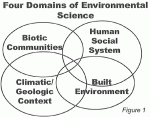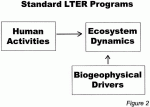Human Dimensions of Ecosystem Analysis: Enriching the LTER Perspective A Report from the LTER Committee for Socioeconomic Research
The social sciences have been incor- porated to some degree in several of the LTER sites, particularly those that have received funds to conduct regional studies and the new, urban sites. Unlike the biophysical components of the LTER sites, however, there has been no structured or systematic approach to the social sciences within the entire LTER network to identify and address
- Significant social or "integrated" science questions
- Cross-site studies
The semi-annual meeting of the LTER network in Madison, Wisconsin in October, 1998 focused on social science research from various LTER sites. During the presentations it became apparent that there were some common research themes. It was suggested that, similar to a core set of biophysical themes, the LTER network could identify a core set of social science themes. A group met after one of the sessions and discussed some ideas for how to organize and coordinate social science efforts at the LTER sites and to develop a "white paper" describing a vision for comparable social science research in the LTER network.
Definition of the Issue
In a special section of a recent issue of the journal Science, several distinguished ecologists reached the conclusion that "most aspects of the structure and functioning of Earth’s ecosystems cannot be understood without accounting for the strong, often dominant influence of humanity" (Vitousek, Mooney, Lubchenco, and Melillo 1997:494). Furthermore, in a letter to the editor of Science only a few weeks ago, 20 ecologists called for their colleagues to devote increased energy to understanding and better managing human influences over ecosystem function (Bazzaz et. al. 1998). Member programs of the LTER Network have long recognized that humans have had significant impacts on their study areas, but these have most often been treated as a form of external disturbance. Although adequate in some respects, this approach underestimates the pervasiveness of human influence. To truly understand human actions and influences upon ecosystems, it is essential to integrate the approaches developed in the social, behavioral, and economic sciences with those of the life and earth scientists already working at LTER sites.
Status of LTER
Primary among the goals of all LTER sites is to understand the long-term dynamics of ecosystems. The simplified model shown in Fig. 1 defines the intellectual arena within which LTER ecologists typically work. Although powerful in that it includes both natural and human-induced processes influencing long-term ecosystem dynamics, several important interactions and feedbacks are missing. Human activities that influence ecosystem dynamics are certainly driven by socioeconomic forces, but are also influenced by the biogeophysical drivers and the ecosystem dynamics themselves (see Fig. 2). Without understanding these interactions, our view of ecosystem dynamics both at the local and global level will be limited—as will be our ability to apply these insights to public policy and land management. The National Science Foundation has demonstrated its recognition of this problem by establishing an agriculturally focused LTER in 1987, providing socio-economic augmentations to two LTER sites in 1994, and awarding of two urban LTER’s in 1997. The early results of these experiments are promising and at the October LTER Coordinating Committee meeting a strong consensus was expressed on the value of increasing these efforts.
Strategic Plan
In order to effectively integrate socioeconomic perspectives into LTER research it is necessary to establish a framework for inquiry that will act as a starting point for each participating LTER to develop their own research agenda. The establishment of a standing committee on socioeconomic research is an appropriate first step, but what is needed now is a workshop including both LTER scientists and other distinguished social scientists to propose the actual framework.
At the Wisconsin meeting several of us put together an initial effort that could serve as a trial balloon for the workshop. We suggested that there are three fundamental drivers of human elements in the ecosystem:
- Creation and maintenance of institutions and organizations
- Flows of information and knowledge
- Incorporation of culturally based attitudes, values, and perceptions
These drivers represent processes that guide human activities and decisions. Although understanding the nature and interaction of these drivers must be the ultimate goal of most inquiries, the actual investigations will more often be oriented toward measuring the patterns of behavior these processes create. Defining the following core topics -- each characterized by its activities, structure, and historic trajectory -- is key to an augmented, comp-rehensive approach to ecosystem analysis.
- Land use and management
- Designed environment
- Economic systems
- Demographic patterns
- Power hierarchies
Collectively, these core topics serve as guidelines of inquiry analogous to the five biological core areas identified early in the LTER program’s history. On the one hand, they reflect the processes driving the system and, on the other, they are a practical guide for field investigations. If the NSF accepts our recommendation to establish new core topic areas, such as the five suggested above, then it is essential that "minimal standard social science capacity" be established at each LTER site. This will take different forms at each type of LTER site, but it will also share certain parameters.
Concomitant with the establishment of these standards should be an evaluation of the effectiveness of each LTER site for addressing specific issues as well as the possibility of a limited expansion to new sites. A key step in realizing this initiative would be to secure partners within the National Science Foundation, such as SBE, GEO, ENG, and EHR, to help in planning and underwriting the new programs.
Needed Resources
Happily this process can begin with a very modest commitment of resources and can be evaluated at each step. It is recommended that funds be provided for:
- A workshop organized by the LTER Network Office to bring together LTER scientists with other scholars interested in the integration of social sciences with ecosystem analysis
- Expansion of the socioeconomic augmentation grants to more LTER sites
- Underwriting minimal social science capacity at all LTER sites
- Expand funding to meet special needs of urban sites
- Consider possibility of new LTER sites
Contacts: LTER Network Committee on Socioeconomic Research co-chairs Charles L. Redman (CAP) and J. Morgan Grove (BES).
References:
Bazzaz, F. and 19 others. 1998. Ecological science and the human predicament. Science 282:879.
Vitousek, P.M., H.A. Mooney, J. Lubchenco, and J.M. Melillo 1997. Human domination of Earth’s Ecosystems. Science 277:494-499.

 Enlarge this image
Enlarge this image
